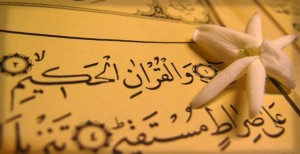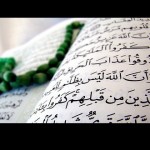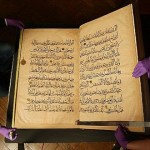Was the Qur`an collected during the time of the Noble Prophet ?
We do know that the name of the first chapter of the Qur`an is Fatihatul Kitab, which means ‘the Opening (chapter) of the Book (Qur`an)’, and from various traditions of the Noble Prophet (s.a.w) it can be plainly concluded that this chapter had been familiar, by this very name, during the time of the Noble Prophet (s.a.w) too.
From here we are led to a very important Islamic issue that is contrary to what is popular amongst a particular group, which is of the opinion that the Noble Qur`an existed in a scattered form during the time of the Noble Prophet (s.a.w) and it was during the period of Abu Bakr, ‘Umar or ‘Uthman that it was gathered together in the form of a book.
The Qur`an, during the time of the Noble Prophet (s.a.w), had been gathered together and possessed the same form and arrangement as we see it today – commencing with this same chapter of al-Hamd. If not for this, there exists no justification for it to be named as the Fatihtul Kitab, for neither was it the first chapter to have been revealed to the Noble Prophet (s.a.w) and nor does there exist any other reason for it to be named so.
Various other evidences also exist, which serve to corroborate this reality that the Qur`an, in the form of a collection and assemblage as it is in our possession today, had been collected during the time of the Noble Prophet (s.a.w) and upon his orders.
‘Ali b. Ibrahim narrates from Imam as-sadiq (a.s) that the Noble Prophet (s.a.w) said to ‘Ali (a.s): “The Qur`an exists (in the written form) on pieces of silk, paper and the like, and are scattered (so) gather them together. The narrator then adds that ‘Ali (a.s) departed from the gathering, collected them in a yellow cloth and put a seal upon it.”32
وَ انْطَلَقَ عَلَي فَجَمَعَهُ فَي ثَوْبٍ أَصْفَر ثُمَّ خََتَمَ عَلَيْهِ.
Another testimony in this regard is that of the renowned Sunni scholar Khwarizmi, who, in his book Manaqib, reports from ‘Ali b. Riyah that ‘Ali b. Abi Talib (a.s) and Ubayy b. Ka’b collected the Qur`an during the time of the Noble Prophet (s.a.w).
The third evidence is the statement of the renowned Sunni author Hakim, in his book Mustadrak, wherein he quotes from Zaid b. Thabit: “Zaid says: ‘We used to gather the Qur`an from the scattered pieces in the presence of the Noble Prophet (s.a.w) and used to place them (the scattered pieces) in their respective positions according to his orders. However, these written works were still not in the form of a collection (and so) the Noble Prophet (s.a.w) ordered ‘Ali (a.s) to gather them together in one place and asked us to be wary of losing or destroying it.’”
Sayyid Murtaza, the great Shi’ite scholar says: “The Noble Qur`an had been collected, in its present form, during the time of the Noble Prophet (s.a.w).”33
Tabarani and Ibn ‘Asakir narrate from Shu’bi that six persons from the Ansar (Helpers) gathered the Qur`an during the time of the Noble Prophet (s.a.w)34 and Qutadah narrates: “I questioned Anas as to who gathered the Qur`an during the time of the Noble Prophet (s.a.w) and he replied: ‘Four persons, all of whom were from the Ansar – Ubayy b. Ka’b, Mu’adh, Zaid b. Thabit and Abu Zaid.”35 Apart from these, there are several other traditions too, but mentioning them would only serve to prolong the discussion.
In addition to these traditions that have been mentioned in the Shi’ite and Sunni sources, the selection of the name Fatihatul Kitab for Suratul Hamd is a living testimony for proving this issue.
One Question
At this point the question that arises is: how can we accept what has been stated above when it is popular amongst some of the scholars that the Qur`an had been gathered after the Noble Prophet (s.a.w) (either by ‘Ali (a.s)) or some other individual?
In answer to this, it must be said that what Imam ‘Ali (a.s) had collected was not just the Qur`an but, in fact, was a collection which comprised of the Noble Qur`an, its commentary, occasions of the revelations of the verses and other related issues.
As far as ‘Uthman is concerned, there exists a Qur`an, which indicates that he, in order to prevent discrepancies and differences with respect to the recitation of the Qur`an, endeavoured to prepare a common Qur`an, which possessed (a common) punctuation and manner of recitation (since till that time, punctuation had not been prevalent)
As for the insistence on the part of some, that the Qur`an had not been gathered at all during the time of the Noble Prophet (s.a.w) and it was either ‘Uthman or the first or the second Caliph, who came to acquire this honour, it probably arises out of attempts to extol the virtues and excellences for them. As a result, we find that every group attributed this honour to a particular person and then narrated traditions in his favour.
Basically, how is it conceivable that the Noble Prophet (s.a.w) would overlook such an important task, whereas he had been mindful of matters that were of much less significance? Is not the Noble Qur`an the Constitution of Islam, the great Book of training and education, and the basis for all Islamic concepts, notions and beliefs? Did the non-collection of the Noble Qur`an during the time of the Noble Prophet (s.a.w) not entail the danger that parts of the Qur`an could be lost or marred and dissentions could arise amongst the Muslims over it?
Apart from this, the famous tradition of Thaqalain, which both the Shi’ites and the Ahlus Sunnah have narrated and in which the Noble Prophet (s.a.w) had said: “I leave behind amongst you two weighty things – the Book of Allah and my Ahlul Bayt,” itself proves that the entire Qur`an had been collected in the form of a book.
If we observe the traditions which indicate that the Qur`an had been collected by a group of companions under the supervision of the Noble Prophet (s.a.w), the fact that we differ in the number of individuals engaged in the task, should not be a matter of concern for it is possible that each of these traditions mentions only some of the individuals who had been engaged in the task of collecting and gathering the Noble Qur`an.




